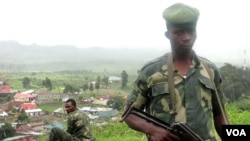Advantageously located in the heart of Africa, the Democratic Republic of the Congo should be one of the continent’s political and economic powers. With the third largest population in the sub-Sahara region, robust rivers to be dammed for hydroelectric power, vast tracts of timber and fertile soil, and many of the continent’s most precious minerals, its potential is almost limitless.
Potential and fact are two different things, however, and since its independence in 1960, fate has not been kind there. For more than 50 years the DRC has suffered from a recurring cycle of military coups, dictatorships, rampant corruption, health pandemics, illegal armed groups, ruinous inflation, illicit exploitation of natural resources, ineffective development schemes and poor governance. Civil strife and armed insurgencies have compounded the tragedy, at the cost of more than 5 million lives since 1998.
The international community has offered significant assistance during the crises and strife. Numerous governmental and non-governmental sources have provided economic and humanitarian aid, and the DRC has had a recurring UN peacekeeping presence. Still, the nation remains in the eyes of many a case study in all the problems that have afflicted Africa in recent history.
In a speech February 11 at the Brookings Institution, a leading Washington think tank, U.S. Assistant Secretary of State for African Affairs Johnnie Carson repeated our nation’s belief that despite the DRC’s seemingly intractable troubles, it would be a mistake for the international community to give up on it.
The nation’s chronic instability has serious consequences for both central Africa and the wider world. Armed groups have used the DRC wilderness as a base of operations, sending hundreds of thousands fleeing from their homes. Since last spring, the M23 rebel movement has contributed to further displacement of eastern Congo’s people, and the resulting humanitarian and military crisis has diverted scarce resources to addressing the conflict in the eastern provinces.
A stable DRC, on the other hand, could become a leading exporter of natural resources and agricultural goods, its rainforest managed in a way to conserve biodiversity and combat climate change.
The international community has a both a moral imperative and vital strategic interest to end the violence there, Secretary Carson said. Otherwise the same cycle of violence and crisis will continue into the future.
Potential and fact are two different things, however, and since its independence in 1960, fate has not been kind there. For more than 50 years the DRC has suffered from a recurring cycle of military coups, dictatorships, rampant corruption, health pandemics, illegal armed groups, ruinous inflation, illicit exploitation of natural resources, ineffective development schemes and poor governance. Civil strife and armed insurgencies have compounded the tragedy, at the cost of more than 5 million lives since 1998.
The international community has offered significant assistance during the crises and strife. Numerous governmental and non-governmental sources have provided economic and humanitarian aid, and the DRC has had a recurring UN peacekeeping presence. Still, the nation remains in the eyes of many a case study in all the problems that have afflicted Africa in recent history.
A stable DRC ... could become a leading exporter of natural resources and agricultural goods.
In a speech February 11 at the Brookings Institution, a leading Washington think tank, U.S. Assistant Secretary of State for African Affairs Johnnie Carson repeated our nation’s belief that despite the DRC’s seemingly intractable troubles, it would be a mistake for the international community to give up on it.
The nation’s chronic instability has serious consequences for both central Africa and the wider world. Armed groups have used the DRC wilderness as a base of operations, sending hundreds of thousands fleeing from their homes. Since last spring, the M23 rebel movement has contributed to further displacement of eastern Congo’s people, and the resulting humanitarian and military crisis has diverted scarce resources to addressing the conflict in the eastern provinces.
A stable DRC, on the other hand, could become a leading exporter of natural resources and agricultural goods, its rainforest managed in a way to conserve biodiversity and combat climate change.
The international community has a both a moral imperative and vital strategic interest to end the violence there, Secretary Carson said. Otherwise the same cycle of violence and crisis will continue into the future.






